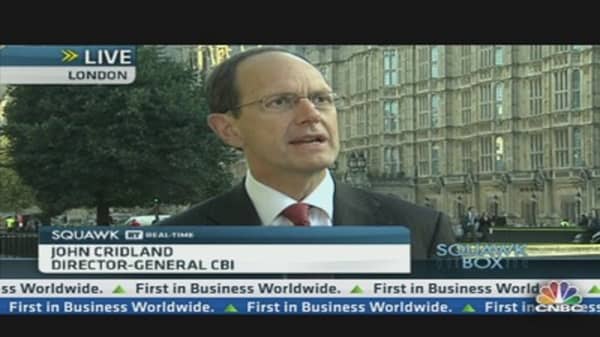The UK government’s reshuffle of key positions within the cabinet keeps too much of the old guard to get the economy moving, a key business leader told CNBC Wednesday.
“We don’t see enough action on the ground, we don’t see enough momentum or energy.
It felt to me more of a reshuffle rather than a new cabinet and there are lots of the same faces so I am not sure it will leave the business community feeling that things are different,” John Cridland, Director-General at the Confederation of British Industry said.
Prime Minister David Cameron will hold his first parliamentary question time Wednesday.
The session is likely to include some sharp criticism from the opposition and from within the coalition government of his sackings and appointments.
Following Tuesday’s first cabinet reshuffle since Cameron took office over two years ago there are suggestions that some of the moves were strategic, ensuring a more "right-wing" agenda at the core of his cabinet.
The highest profile appointments in the reshuffle included James Hunt, formerly the Culture Secretary and the subject of much scrutiny during the Leveson enquiry into media ethics taking over the Health Secretary position.
Chris Grayling, formerly Employment Secretary, took over the Justice Secretary position from veteran Tory politician Kenneth Clarke. Unpopular Finance Minister George Osborne, who was booed at the Paralympic games during his presentation of a medal, keeps his post.
Baroness Sayeeda Warsi was replaced by Grant Schapps as the party chairman. He told CNCB that the party wanted to move towards delivering the policy of the government.
“What you have is a team of people from business and economic backgrounds who know how to get things done, work the system and get the things through,” he said.
Cridland said the appointment of Paul Deighton to the Treasury, a former Goldman Sachs banker who is on the Committee for the London 2012 Olympics, could be exciting as he will be tasked with delivering the economic policies on the ground.
“I am a bit excited about that. His title will be minister for infrastructure and economic delivery and for the last year I’ve been calling for economic delivery through infrastructure but he is not in the cabinet so it’s one appointment of many,” he said.
Despite the measures by the Bank of England of more money printing through its quantitative easing program, the U.K. is in its worst double-dip recession for 50 years following a contraction in gross domestic product (GDP) in the second quarter.
One particular bone of contention has been that despite the billions more available in the money supply, the program has failed to trickle down to consumers and small businesses crucial to the recovery.
Cridland said new housing policies and a one-stop shop for small businesses should be central to government policy to reverse the economic stagnation.
“A small business bank could bring all the different schemes together and housing would get citizens noticing a difference and would boost spending,” he added.




